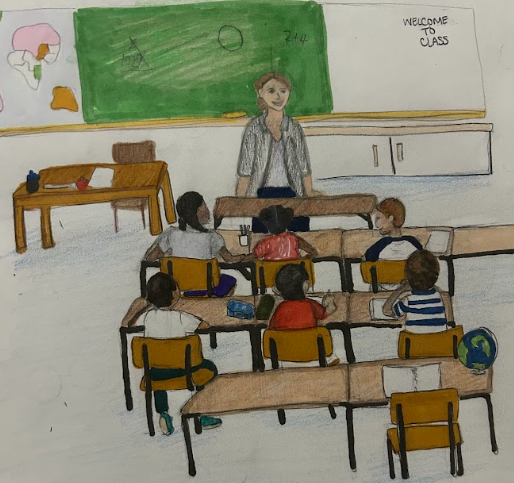Throughout the district, children as young as six years old are provided with and have access to tablets. In what feels like a million years ago, and prior to the COVID-19 pandemic, Lynbrook students had to patiently wait until middle school to receive laptops. However, during the COVID-19 pandemic, children in the district were quickly handed computers for virtual learning and Webex calls. There now emerges a new issue: the reliance on technology amongst all students in Lynbrook. Seeing as how schools have finally returned to a fully in-person routine, there seems to be no valid reason for younger students to keep these devices.
The use of technology, such as smartboards and computer labs in school has long been a common occurrence, even before the pandemic. Still, the mere existence of tablets is not the main issue; instead, it is the concerning misuse of them. When laptops are taken home, students are made to spend extra hours glued to screens instead of using paper for their homework, making them more reliant on technology. Freshman Gianna Gardener believes tablets have a negative impact on younger students: “A child should not become reliant on technology at such a young age or be staring at a screen for that much time during and after school.”
Gardener is not alone in feeling that tablets are having an undesired effect on modern-day students. Do not be misled, this idea is not without its scientific backing; studies have shown that students show improved efficiency learning and recalling information when they are physically writing information down on paper. An article in New Scientist (newscientist.com) revealed that “Writing something down rather than typing it on a computer could help you retain the information better, after researchers found putting pen to paper boosts connectivity between different areas of the brain.” Therefore, with more schoolwork being assigned and completed on platforms such as OneNote and Schoology, students tend to take fewer and lower-quality notes, which ultimately hinder recollection of information, instead of reinforcing it. Moreover, handwriting, an essential life skill, is best developed at a young age when paired with constant practice. It is time to realize that today’s younger students are spending exponentially more time typing away than learning basic writing skills, potentially leading to negative consequences years down the road, anywhere from worsened penmanship to a decreased attention span.
Ultimately, students will inevitably use and depend on laptops at some point in their school career, but there is no use in introducing laptops to first graders when they will have access to them during their middle or high school years when they are more responsible. “Sixth graders understand technology a lot better and understand the consequences of bringing a tablet back and forth to school,” senior Elena McDonald elaborated.
Tablets can often serve as a distraction as students frequently misuse them, often tempting students to “take a break.” Although some websites are successfully blocked on the tablets, it is still difficult for many to focus and learn with the prospect of unlimited distractions being only a finger click away. These endless distractions mean that less time is being spent listening to a lesson in favor of more time being spent playing games on the tablet.
Moreover, other students have also agreed that elementary school may be too early to become reliant on tablets. Sophomore Aidan Pearsall explained, “I think that it depends on how well and mature a kid can be with technology. Elementary school may be a little too young for kids, and middle school is an appropriate age.” Therefore, many agree that the use of tablets would only benefit students if first assigned at a middle or high school age.


















